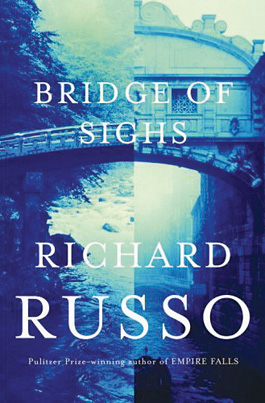home | metro silicon valley index | the arts | books | review

Bridge of Sighs
Reviewed by John Freeman
If Richard Russo's lambent, mournful new novel were a university, there could only be one quote chiseled above its entrance gates, from Emerson: "Though we travel the world over to find the beautiful, we must carry it with us or we find it not." The characters in Bridge of Sighs—Russo's first novel since his 2001 Pulitzer Prize winner, Empire Falls—could have benefited from a refresher course with Concord's wise man. Throughout this book, they fret over the lives they did not live, the places they did not go. This lugubrious, reflective mood has always been a main key in Russo's register, but here it deepens to an almost Hawthorne-like dreaminess.
Once again, things kick off in an upstate New York town. This time, it's called Thomaston, where the tannery has slowly poisoned the water. Louis Charles "Lucy" Lynch tells us that "you're unlikely to have heard of Thomaston, unless you work in medical research, in which case you may remember the now-famous study done years ago to explain why our cancer statistics were off any actuarial chart." Although many people would leave a city where the river ran red, Lucy elected to spend his whole life there, amassing a miniempire of grocery stores. As we begin, he and his wife of 40 years, Sarah, are preparing for a first-time trip to Venice, a vacation that could thrust them into contact with Lucy's former best friend, Bobby Marconi, who has remade himself as a world-renowned painter.
Bobby isn't the only person in this book who has reinvented himself. In ways both large and small, all the characters find themselves standing on the opposite shore from former identities. Lucy, the son of a milkman, moved from one side of town to the other and left part of himself behind. Sarah makes a similar class journey, as did her father before her, an aspiring novelist who became a schoolteacher. Of all Russo's novels, Bridge of Sighs is the most curiously mediated. Lucy's sections about his childhood come in the form of a memoir he is writing. With Bobby, we have his paintings: they've recently tipped into self-portraits in which he sees the haunted visage of his own father. Art is a form of therapy in the novel, but an unsuccessful one, more like a stagnant river into which the characters gaze in hopes of seeing their watery reflections.
Through Lucy's narrations we learn of emotional ruptures that, over time, have acquired all the subtlety and menace of a tectonic movement. We also learn that Sarah and Bobby once had a romance. In Venice, Bobby is philosophical: "Had she married him instead of Lucy, a different sort of peace would have been required, one that would have ensured an even greater misery." In typical Russo fashion, Bridge of Sighs sketches these developments patiently—sometimes a little too patiently, winding and rewinding narrative threads so thickly that by the book's close the choices Sarah, Bobby and Lucy make don't seem like choices at all. Instead, they feel like the will to power of that peculiar American institution of which Russo is our best chronicler: the family. No surprise, Philip Larkin's famous quote about families—"They fuck you up"—winds up in the book. But this feels too glib, too unequivocal a summation of the portrait Russo paints of familial legacies. A more appropriate one might be the Hawthorne quote Billy Costigan spits at Capt. Queenan in Martin Scorsese's The Departed: "Families are always rising and falling in America." True, indeed. And seldom are the emotional echoes of this tidal shift painted as well as they are here. (By Richard Russo; Knopf; 544 pages; $26.95 cloth)
Send a letter to the editor about this story.
|
|
|
|
|
|